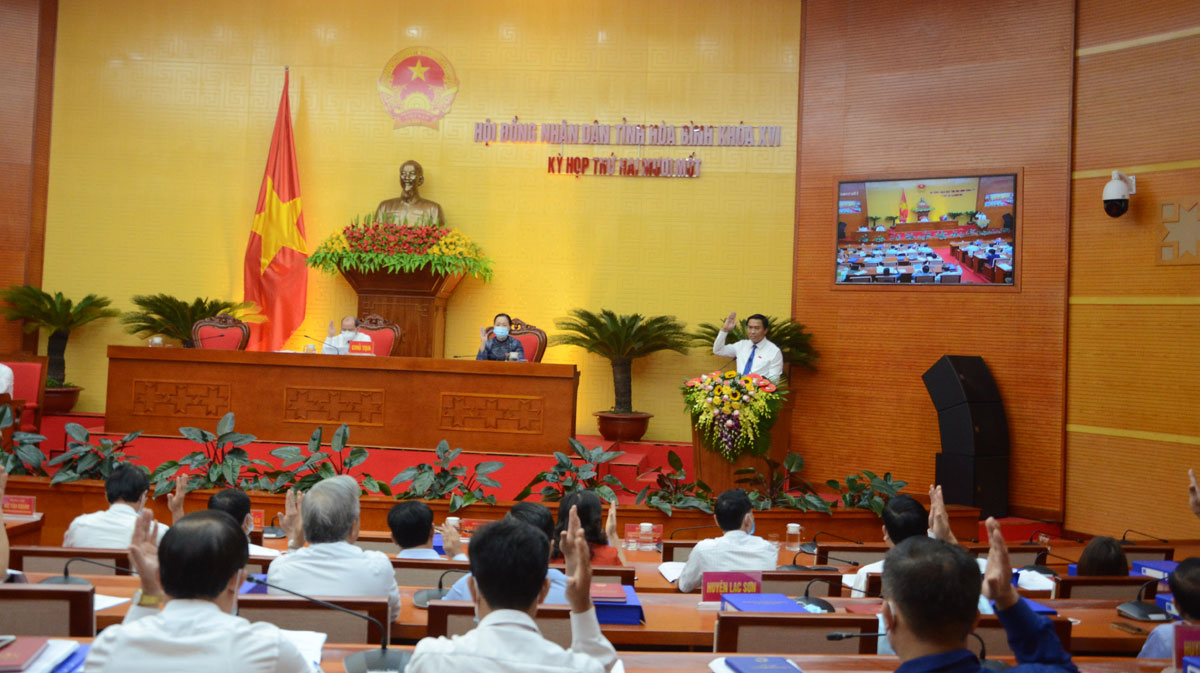
(HBO) - The 21st meeting of the 16th provincial People’s Council for the 2016 – 2021 tenure, convened on April 28 with the presence of Secretary of the provincial Party Committee Ngo Van Tuan. The event was chaired by Chairman of the provincial People’s Council Bui Duc Hinh and vice chairpersons Nguyen Thi Cam Phuong and Vo Ngoc Kien.
 Delegates vote to adopt resolutions submitted to the meeting.
Delegates vote to adopt resolutions submitted to the meeting.
In his opening remarks, Hinh, who is also Vice Secretary of
the provincial Party’s Committee, said the 21st sitting focuses on
seeking feedback on a medium-term public investment allocation plan for the
next five years and consider the in-principle approval for 10 transport
projects. They are very important issues for the province’s socio-economic
development, he said.
Provincial People’s Council deputies then discussed the
medium-term public investment allocation plan, with focus placed on identifying
sources of public investment for the projects and reviewing a capital
allocation plan for 2021 – 2025.
In the morning’s session, the meeting adopted a total of 11
resolutions on various matters, including the medium-term public investment
allocation plan for 2021 – 2025; in-principal approval of a regional road
linking Hoa Binh and Hanoi and Son La Expressway’s section connecting Hoa Binh
and Moc Chau; upgrade of Vay Nua – Tien Phong inter-commune road (Da Bac district),
road linking Ho Chi Minh Road and Thanh Ha Industrial Park (Lac Thuy district),
Provincial Roads 440 and 450 and Road 446; construction of the first phase of
roads linking Phu Cuong – Go Lao (Mai Chau district), Quang Tien – Thinh Minh
(Hoa Binh city) and Luong Son – Xuan Mai.
Concluding the event, Hinh asked all-level administrations
to effectively enforce the resolutions for the accomplishment of all
socio-economic development goals this year and beyond./.
Hoa Binh province is undergoing a dynamic transformation amid Vietnam’s national digital transition. Building on Poliburo’s Resolution No. 57-NQ/TW on breakthroughs in science, technology, innovation, and national digital transformation, the province has rolled out a wide range of practical action plans. A standout initiative is the "Digital Literacy for All” movement, an effort to ensure that no one is left behind in the digital era.
Hoa Binh province is undergoing a dynamic transformation in the wake of the national digital transformation movement. Building on Resolution No. 57-NQ/TW of the Politburo on breakthroughs in science, technology, innovation, and national digital transformation, the province has implemented a wide range of practical action plans. A standout initiative is the "Digital Literacy for All” movement ambitious effort to ensure that no one is left behind in the digital age.
With a spirit of unity and proactive problem-solving, the Party Committee, the government and the people of Dong Lai Commune (Tan Lac District) have made great strides in implementing the resolutions of the 24th Party Congress of the commune for the 2020 - 2025 term. Focusing on leadership and practical actions, the commune has brought the Party’s resolutions into daily life, creating strong impacts and pushing the local development forward.
Amid the nationwide push for digital transformation, young people in Hoa Binh Province are stepping up as dynamic pioneers, applying technology to enhance Youth Union operations and expand the reach of youth-led initiatives. Through creativity and adaptability, Youth Union organizations at all levels have introduced a series of practical solutions, contributing to modern governance and community development.
In recent years, An Nghia commune, located in Lac Son district, has stepped up administrative reform, focusing on improving the quality and efficiency of its single-window service unit for receiving and processing administrative procedures. These improvements have helped create favourable conditions for local residents and organisations to handle administrative procedures, contributing to the commune’s broader socio-economic development.
The Prime Minister-approved master plan to develop the multi-use value of forests ecosystems through 2030, with a vision to 2050, aims to improve the management and sustainable use of forest resources, create jobs, increase incomes, and improve the living standards of ethnic minorities, people in mountainous and remote areas, forest workers and those living near forests.



 Delegates vote to adopt resolutions submitted to the meeting.
Delegates vote to adopt resolutions submitted to the meeting.